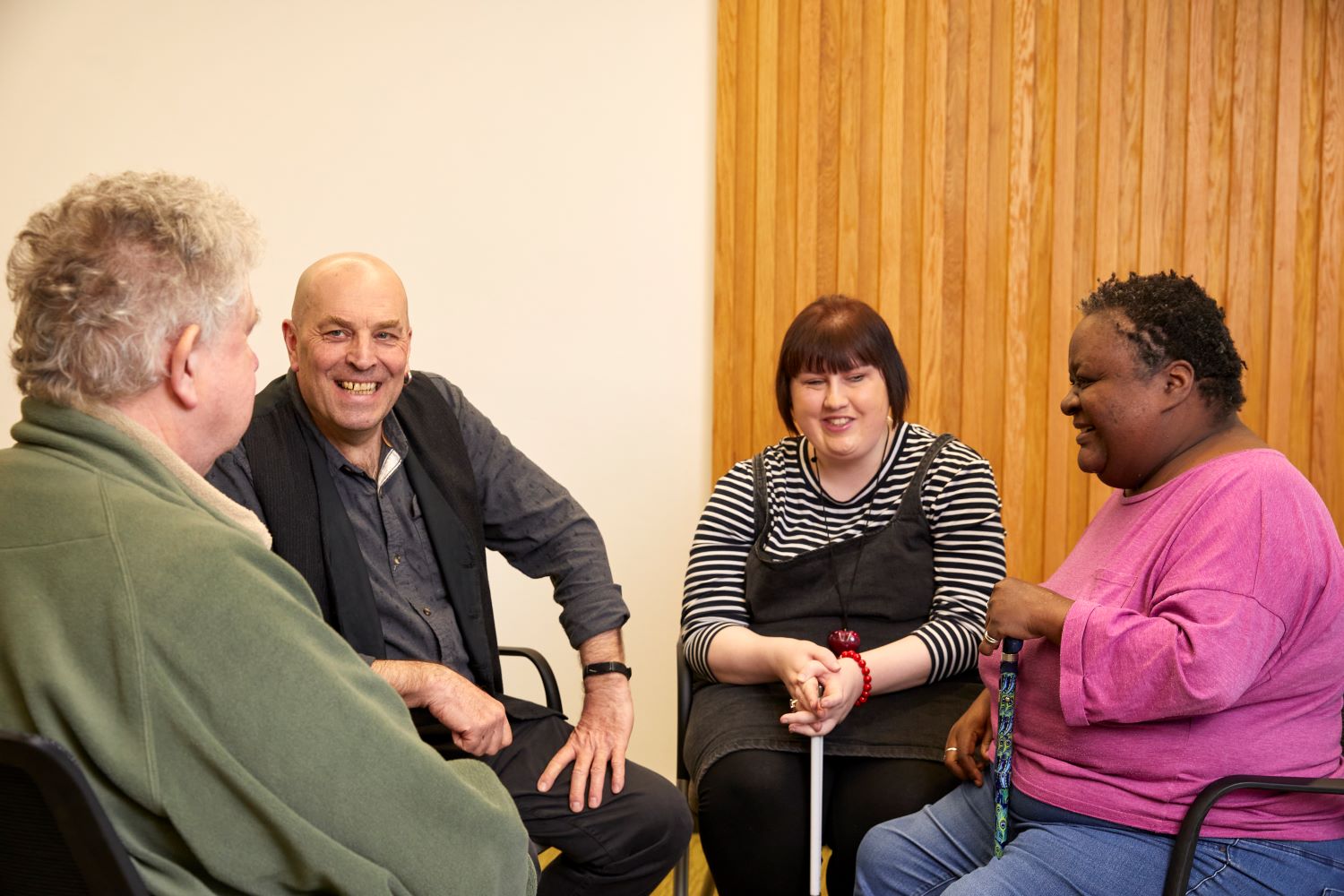Change the script: a guide on how to talk and write about social work
This guide is for those who want to support the Change the Script campaign.

Change the script: a guide on how to talk and write about social work
This guide provides information and practical suggestions for how to tell an accurate story of social work; one that recognises the positive impact social workers have on millions of people’s lives.
View the PDF version of the guideAbout this guide
This guide provides information and practical suggestions for how to tell an accurate story of social work; one that recognises the positive impact social workers have on millions of people’s lives.
It is for anyone who talks or writes about social work, from charities and policymakers to journalists and screenwriters. It gives simple tips on how to explain what social workers do and how to represent social work.
Social work is a complex profession. Because of its complexity, this guide doesn’t cover every element of social work practice.
Social work is often misunderstood and misrepresented. Social workers are highly trained and regulated professionals, yet there is limited public understanding of their role.
TV and the media often portray social work negatively for dramatic purposes, and many of the stories play into stereotypes such as social workers taking children away from their families. As some people won’t encounter social workers, this representation plays a key role in shaping public perceptions and attitudes about the profession. For many, it is their only reference point.
Negative perceptions and portrayals of social work can be highly damaging. At worst, they may fuel fear or suspicion from the very people social workers exist to support. Within the profession itself, negative representations can lead to low morale and retention issues. Such representations can also contribute to recruitment challenges.
Yet social work plays a vital role in our society. We want to increase public confidence in the profession so that people have trust and understand the diverse range of social work services that exist to support them when they might need it, at any point in their life.
As a profession, social work in England is regulated by Social Work England. Its primary role is to protect the public and raise professional standards, so that people receive the best possible support from social workers.
As a regulated profession, this means that all social workers must meet robust professional standards which set out what they should know, understand and be able to do to practise safely and effectively. They must have undertaken extensive training and education through regulatory assured routes. This ensures that each individual social worker is equipped with the right set of skills and knowledge to work with people, empowering them to improve their lives.
Social Work England co-produced this guide with:
- social workers
- national social work organisations
- people who have lived experience of social work
The guide draws on our own research into public perceptions of the social work profession as well as further research, data and insight.
A social worker’s role is to listen to and support individuals, families, and communities, helping them find solutions to challenges and promoting their human rights and wellbeing. Social workers also protect people from harm when necessary.
Social workers usually work with several different people at one time. They often specialise in a specific field of work. For example, working with people with physical disabilities, older people, or children in care.
Social workers work in a range of places. This includes, but is not limited to, local authorities, hospitals, courts, prisons, schools and charities.
A social worker might come into someone’s life for a short period of time; for example, to help them navigate the care system or access a specific service like housing. Or a social worker might be in a person’s life for a longer period; for example, if they have long-term or complex needs. Social workers work alongside other professionals such as nurses, teachers and carers to deliver support.
Summary of recommendations
Recommendation 1: Align social work with other regulated professions
- Emphasise that social workers are regulated and explain what this means.
Recommendation 2: Communicate the breadth of the role.
- Show social workers in the range of settings they work in.
- Show that social workers work with adults as well as children and families.
- Avoid solely focusing on crisis.
- Recognise the individual behind the role.
Recommendation 3: Avoid making broad claims about what the public thinks of social work. Be clear that people’s personal views of social work are generally positive.
- When portraying social workers, don’t just focus on the negatives.
- Talk about the positive views many people have about social work.
Recommendation 4: Focus on how social work benefits people.
- Reflect the processes social workers must follow and the legal frameworks they operate in.
- Explain that social workers are often part of a team of professionals.

Recommendation 1
Align social work with other regulated professions
A limited understanding of the training required to be a social worker, and of the professional standards social workers must adhere to, could contribute to a perceived lack of respect for the profession, in comparison to other regulated professions.
Research commissioned by Social Work England found that 44% of adults in England think social workers are respected in society. This is far behind the levels felt for doctors (90%), nurses (86%), pharmacists (85%), physiotherapists (83%), lawyers (69%) and teachers (67%). The research also found that there is limited understanding that social workers are regulated, with only 52% of adults saying they were aware of this.
The role of a social worker is often confused with other caring or support roles which, while absolutely essential for society, are not underpinned by the same level of training, education, academic rigour and accountability for potentially life-changing decisions.
Emphasise that social workers are regulated and explain what this means
Social work has been deemed important enough to society to be regulated, due to the level of risk involved. By law, in England, people can only legally practise as a social worker if they’re registered with Social Work England and meet professional standards.
To apply for registration, people must have qualified from a higher education or training course that Social Work England has approved. Routes include:
- a university degree in social work
- a degree apprenticeship
- a fast-track programme, for people with a degree in a subject other than social work
These courses equip students with the knowledge, values, skills and behaviours they need to practise as a social worker. This learning covers law, policy, academic theory, practical skills and experience gained on mandatory work placements. People with lived experience of social work often play a role in shaping and delivering course content.
A social worker’s education and training is not over once they’ve qualified and registered. The professional standards require social workers to continue their learning, completing continuing professional development (CPD). All social workers must demonstrate this every year when they renew their registration.
- Avoid depicting social workers as incompetent.
- Aim to demonstrate that social workers are highly skilled professionals who have completed years of education and training at degree level.
To be registered with Social Work England and legally practise as a social worker, social workers must:
- Promote the rights, strengths and wellbeing of people, families and communities.
- Establish and maintain the trust and confidence of people.
- Be accountable for the quality of their practice and the decisions they make.
- Maintain their continuing professional development.
- Act safely, respectfully and with professional integrity.
- Promote ethical practice and report concerns.

Clair, social worker
"I am care experienced. Now, I aim to be the social worker that my younger self would have benefitted from. That has motivated me for over 20 years."
Recommendation 2
Communicate the breadth of the role
People are more likely to identify the role of social workers in supporting children, in comparison to adults. Social Work England research found that over a third (37%) of adults in England say that social work supports children, compared to just over one in ten (13%) who mention adults.
Most media coverage about social work relates to child protection and it is often negative. In TV shows, social workers tend to work with children and families, rather than in adult social work.
The overwhelming focus on children and child protection can lead to a lack of understanding and recognition of the full spectrum of social work.
Show social workers in the range of settings they work in
As outlined in the ‘About social work’ section of this guide, social work is one profession with many specialisms. Data from Social Work England’s register in December 2024 showed that 35% of social workers worked in adult services, 57% worked in children’s services and 8% worked in other roles. These other roles include academic, strategic, government and research roles, providing knowledge to help make social work as effective as possible.
There is often a perception that social workers only work with people from lower socioeconomic backgrounds. However, many of the issues social workers support with are universal and cut across society.
Avoid solely focusing on crisis
Anyone could need the support of a social worker at any time. Although social workers regularly work with people who are in crisis, they may be in and out of a person’s life at different times for different reasons. Prevention is a significant focus for social workers. They support people to make changes, solve problems, and overcome issues before things get out of control.
Individuals with lived experience of social work have described their social worker as helping them “move forward day-by-day” and like someone “at the end of the track” when they’re running a race. This demonstrates the relationships that social workers build and the breadth of support they provide.
This day-to-day support can span a range of activities. For example, help navigating the benefits system, providing housing advice, managing the adoption process and liaison with other health and care professionals.
Recognise the individual behind the role
Social work is an extraordinary and complex job. This is reflected in the individuals who choose social work as a career. It can be the case that social workers feel drawn to the profession through their own experience of social work, trauma or bereavement. For many, the desire to support others brings them into the profession.
For them, social work can be a vocation and not just a job. The personal qualities and experiences of social workers often drive them to go beyond the functional aspects of their role.
- Avoid only showing social workers with children.
- Aim to use examples of social work that demonstrate the range of the profession.
- Avoid only showing social workers dealing with crises.
- Aim to include information about how social workers help to prevent crises.

Kate, social worker
"I've supported people from a range of backgrounds. For example, I've worked on cases of serious financial abuse with wealthy people who were being taken advantage of."

Recommendation 3
Avoid making broad claims about what the public thinks of social work. Be clear that people's personal views of social work are generally positive.
Research shows that there is a gap between what individuals say they personally think of social work (which is often positive) and how they believe society perceives social work (these views are often negative). For example, Social Work England’s research shows that 74% of adults in England believe social workers want the best for the people they work with. However, only 44% say they think social workers are respected in society.
As outlined in the introduction to this guide, as many people don’t come into contact with social workers their attitudes are often shaped by what they see in the media and on TV.
Although it is the case - as in any profession - that failures can happen in social work, successes mainly go unreported. Where there are failures or concerns raised about a social worker’s fitness to practise, Social Work England investigates such issues and assesses whether the social worker’s practice, conduct or behaviour may pose a risk to the public (now or in the future).
When portraying social workers, don’t just focus on the negatives
It is understandable that negative aspects of social work will feature in media reporting. Similarly in TV and film, often for dramatic purposes. When a negative story of social work feels warranted, where appropriate, acknowledge the context. Social workers operate in challenging circumstances. Their jobs are difficult and complex. Working alongside other professionals, they’re sometimes required to make tough decisions in the best interests of others, and such decisions can be unpopular. Social workers want the best for people – their professional integrity really matters to them.
Where possible, balance negativity with positive stories and references to social work. For example, testimonies of people who have been supported by a social worker, evidence of social workers’ skills and experiences, and examples of social workers’ dedication to achieving the best possible outcomes for the individuals they support.
Seek opportunities to gather and share positive accounts of social work, outside of the media and TV. For example, employers of social workers may have communications that reach different audiences, which could provide a channel for positive stories about social work.
Such stories can be shared proactively – bringing social work’s successes out of the shadows – and not just in response to negative media coverage.
Talk about the positive views many people have about social work
Defaulting to pre-existing stereotypes about social work as an undervalued profession leads to an inaccurate representation of it. Evidence of the positive views many people have about social work can help to shift these stereotypes.
This evidence can come in the form of experiences of those whose lives have been positively impacted by a social worker, or through statistics cited in research. For example, research by Social Work England found that 85% of adults in England agree that social work is important. 62% say social workers make a big difference to people’s lives.
- Avoid depictions of social work that solely focus on the negative.
- Aim to tell a balanced story that includes positive examples of social workers and the people social workers have supported, or proactively share stories of social work success.

Ken, lived experience of social work
"Having a social worker changed my life. She saw the talent and potential in me, motivating me and opening up a different life to me."
Recommendation 4
Focus on how social work benefits people
Social workers on TV are often portrayed as interfering or shown taking children away from families. There can be a sense that social workers exist to take things away – freedoms, autonomy, children.
Reflect the processes social workers must follow and the legal frameworks they operate in
Wherever possible, social workers will ask the people they’re supporting about their thoughts and feelings. They will consider these views when making decisions. However, there are times when social workers must make decisions that those involved don’t agree with. This could include intervening in a person’s life to protect someone from harm or abuse.
Social workers base such decisions and recommendations on evidence they’ve gathered and conversations with the people involved. They consult third parties, other professionals and support services such as police or health organisations involved in the situation.
When making decisions or recommendations, social workers must follow the law and relevant guidance, for example:
- The Care Act 2014
- The Children Act 1989 and 2004
- The Mental Health Act 1983 and 2007
- The Mental Capacity Act 2005
- The Human Rights Act 1998
Explain that social workers are often part of a team of professionals
When a social worker makes a decision on behalf of someone they’re supporting, they rarely make this decision alone. Social workers are often part of a team comprising other professionals including teachers, doctors and other health professionals. Social workers are trained to manage risk and give their professional opinion in the best interests of the people they support.
- Avoid saying that social workers remove children from families without providing wider context behind such decisions.
- Aim to communicate the safety and security that is given to a child who is removed from a dangerous situation.

Callum, lived experience of social work
"Social work is very much lead by you. They're there to empower what you want."
Acknowledgements
Social Work England believe in the power of collaboration and share a common goal with those it regulates —
to protect the public, enable positive change and ultimately improve people’s lives. We want social work to be
the best profession it can be.
We would like to thank the stakeholders and individuals who have contributed to conversations that have helped to shape this guide, including representatives from:
- National Advisory Forum
- Education and Training Advisory Forum
- British Association of Social Workers (BASW)
- UNISON
- Social Workers Union (SWU)
- Principal Social Worker Networks
- Local Government Association
- Association of Directors of Adult Social Services
- Social workers and people with lived experience of social work, including during Social Work Week 2025